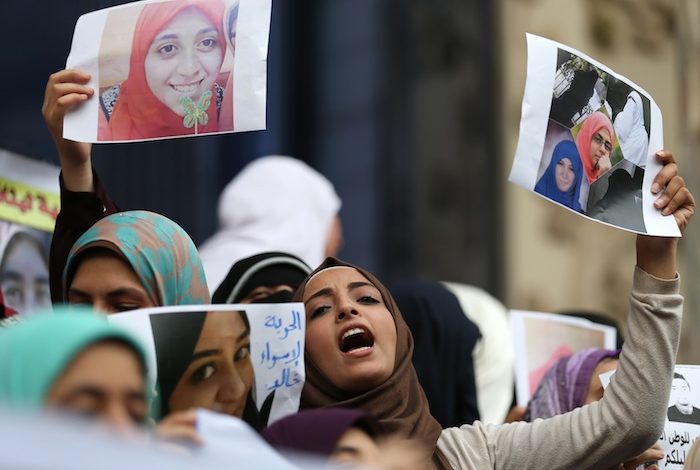
|
| Protesters at an event called Release Our Girls during International Women’s Day, Cairo, March 8 |
March 8 was International Women’s Day. On this occasion, we extend our gratitude to Arab women for their resilience and sacrifices around the world.
In the Arab American community, we are blessed to have strong female leaders in almost every field — politics, business, social justice activism, charity and art.
However, in the Middle East women have been less fortunate because they are not afforded the same opportunities, which diminishes their potential and robs society of their talents, skills and contributions.
Despite legal and social discrimination, Arab women have been heroes and agents of positive change in their communities — from Syrian mothers crossing seas and borders to bring their children to safety to Palestinian female activists fighting the Israeli occupation through all possible means.
It is time for Arab societies to reform discriminatory policies and pass laws to protect women from harassment and abuse.
In Saudi Arabia, a major U.S. ally, women cannot drive. In Yemen, a woman’s testimony in court is considered “half.”
In Lebanon, a seemingly less conservative country, a woman cannot pass the citizenship to her husband and children, even if they were born in the country.
Meanwhile, throughout the Middle East, there is no adequate protection for victims of physical and sexual abuse.
But it has not always been this way; women’s rights have been regressing in the region due to political shifts that are empowering reactionary elements within society. In that context, Western imperialist policies are partly responsible for the suffering of Arab women.
In Iraq, women excelled and had equal access to education and state resources before the 2003 U.S.-led invasion. ISIS was the result of that war. The terrorist group is now raping, stoning and terrorizing women of all religions.
The notion that all Arabs and Muslims are inherently sexist is a false argument used to fuel Islamophobia and bigotry.
But the fact remains that Arab societies have a problem with misogyny and they must address it.
Even at the local level, in some families, boys and girls are held to different standards. Some men mistreat their wives and daughters. Domestic violence is sometimes tolerated out of fear for the reputation of the family.
To be clear, the oppression of women is a global problem, not an Arab one. In the United States, women get paid less than men for doing the same job; women get sexually assaulted at a frightening rate on college campuses; the prevalent rape culture associated with partying makes women an easy target for sexual harassment.
We wish for a day when men and women are treated equally by society and the state.






Leave a Reply